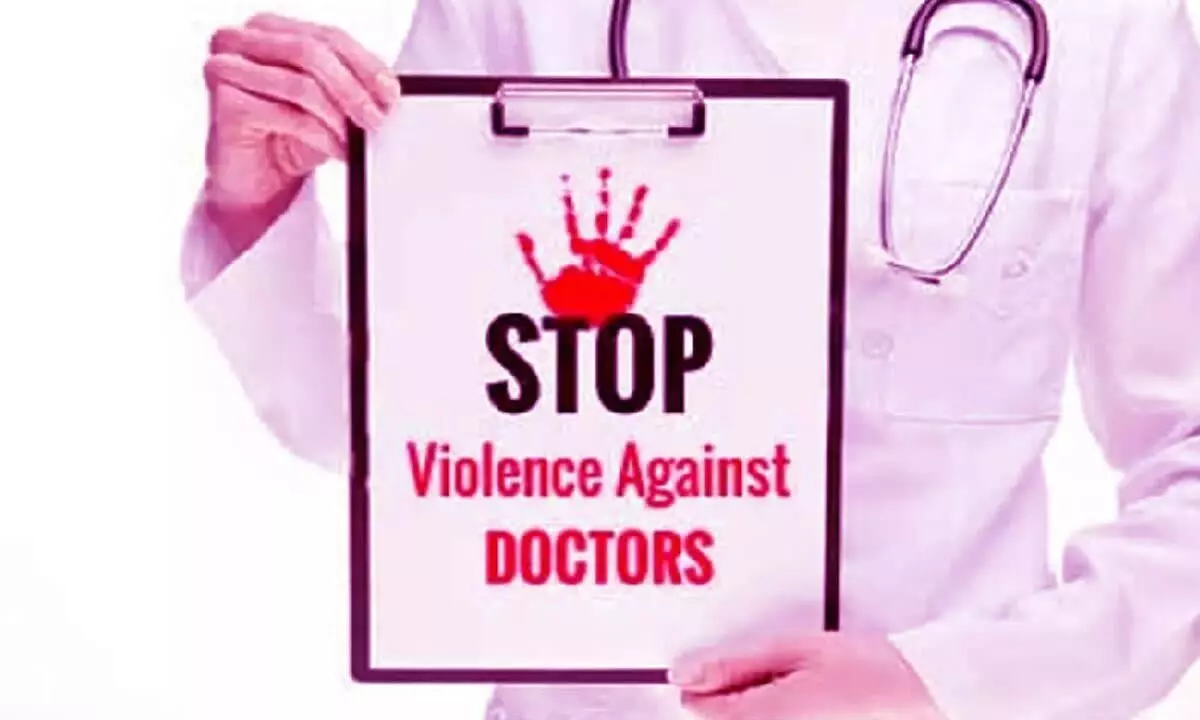Jharkhand shows the way on protecting medical professionals from assaults
State Cabinet approves Jharkhand Medical Service, Medical Service Association (Prevention of Violence and Property Damage) Bill
image for illustrative purpose

When a patient dies, the family members and friends sometimes may get charged up as they come to the conclusion that the death was due to the negligence of the doctors. But, whatever might be the reason for the death, the relatives and the friends of the patients have no right to give vent to their ire and emotions in such damaging proportions
By approving the Jharkhand Medical Service, Medical Service Association (Prevention of Violence and Property Damage) Bill, the State Cabinet has set a fine example in protecting the interests of medical professionals in the state. This will go a long way in helping the cause and will serve as an example worthy of emulation, if implemented in letter and spirit.
Some of the provisions in the bill include jail term of up to two years and a monetary fine of up to Rs 50,000 against those found guilty of assault on medical professionals and vandalising hospital properties, including the private ones.
However, after its introduction in the state Assembly, the bill, seeking to prevent doctors, healthcare staff and hospitals from attacks by patients and their relatives, was sent to the Select Committee for proper study when MLAs, cutting across party lines, opposed some of the provisions in it. The doctors are an agitated lot as the state has been witnessing several cases of attacks in hospitals, involving medical professionals and family members of patients.
Two such attacks happened this year in Garhwa and Dhanbad districts, leading to strikes by medical professionals from the two districts. For quite some time, doctors have been demanding protection for medical professionals after several assaults that put their life at risk. They had threatened to go on strike for an indefinite agitation if the bill was not approved. The doctors went on a day-long boycott of medical services on March 1 to protest against the ‘repeated assaults’. They also organised a candlelight march on March 5.
Associations of doctors called off their proposed strike in Jharkhand last month after a meeting with the state government. A delegation of doctors recently met officials and discussed various issues, such as amendments to the Clinical Establishment Act for the protection of medical practitioners. Safety and security in hospitals have been a matter of great concern in the country. There have been reports of intermittent violence against the medical fraternity by relatives of the patients in different parts of the country.
More recently, Dr Archana Sharma, a doctor who was booked for allegedly causing the death of a pregnant woman at a private facility in Rajasthan’s Dausa district, committed suicide. Her death has come as a shock to the medical and non-medical fraternity of the country. The incident once again triggered a debate about the need to create a peaceful ambience in healthcare institutions in the country. In fact, Dr Archana Sharma’s case is not an isolated case.
There have been several such cases in the past where in doctors and other medical professionals have been bearing the brunt from violent relatives of patients. When a patient dies, the family members and friends sometimes may get charged up as they come to the conclusion that the death was due to the negligence of the doctors. But, whatever might be the reason for the death, the relatives and the friends of the patients have no right to give vent to their ire and emotions in such damaging proportions. Such violence will only further vitiate the atmosphere in hospitals, which are already crumbling like a house of cards due to overcrowding of patients. Besides, the threat of violence will increase the stress levels of the doctors and healthcare workers. It is a fact that behavioural aberrations of a consumerist society, inappropriate expectations and ignorance of limitations, all contribute to the civilisational degeneration called violence on doctors and hospitals.
Whatever might be the trigger, violence in hospitals will adversely affect patient care and hospitals will be reluctant to admit complicated and risky patients, which will affect critical care in the country.
It is a fact that the doctors, especially in government hospitals, work under tremendous pressure as the doctor-patient ratio in the country has been steadily shooting up.
The World Health Organisation (WHO) prescribes one doctor for 1,000 patients. But according to the National Health Profile in 2015, there is one doctor for a whopping 11,528 patients in government hospitals across the country. In such a working environment, the doctors’ demand for a strict law to punish those who attack doctors is not misplaced.
It is therefore a welcome step by Jharkhand government to introduce a Bill that can prevent violence against healthcare professionals and also punish the individuals for the criminal offence.
As the issue is of great concern, the government should create an amiable working ambience in the hospitals. This will mark a win-win situation for the doctors and the patient community as a whole.
(The author is freelance journalist with varied experience in different fields)

